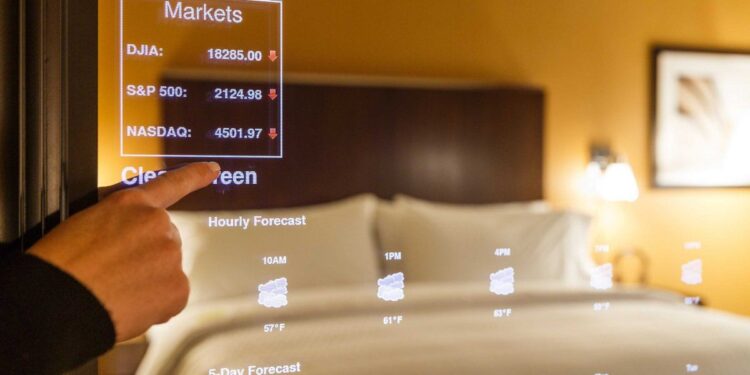Remote Work Reshapes Hotel Industry Futures
The landscape of the hospitality industry is undergoing a profound and irreversible transformation, largely catalyzed by the seismic shift towards remote work. What began as a necessity during global health crises has blossomed into a permanent fixture for millions worldwide, fundamentally altering how and where people live, work, and, crucially, travel. This comprehensive article will delve deep into the multifaceted impacts of this phenomenon on hotels, exploring not just the challenges but also the unprecedented opportunities emerging for savvy operators. We will examine how hotels are adapting their services, rethinking their physical spaces, and innovating their business models to cater to a new breed of traveler – the digital nomad and the remote worker.
The Genesis of a New Era: Remote Work’s Ascendance
Before 2020, remote work was often seen as a niche perk or a temporary solution. Today, it’s a mainstream reality for a significant portion of the global workforce. Companies across various sectors have embraced flexible work arrangements, recognizing benefits such as increased productivity, reduced overheads, and access to a wider talent pool. For employees, it offers greater autonomy, work-life balance, and the freedom to choose their living environment, unshackled from geographical constraints. This newfound freedom has profound implications for the travel and hospitality sectors.
A. The Evolution of the Workspace
The traditional office paradigm, once a fixed requirement, has dissolved for many. This isn’t just about working from home; it’s about working from anywhere. This evolution has created a diverse demand for workspaces:
- Home-Based Work: Many still prefer the comfort of their own homes, but often seek occasional alternatives.
- Co-working Spaces: Dedicated shared offices providing infrastructure and community.
- Third Spaces: Cafes, libraries, and, increasingly, hotels offering flexible environments.
- Travel-Based Work: The ability to combine work with leisure, blurring the lines between business trips and vacations.
B. Shifting Traveler Demographics
The rise of remote work has given birth to or significantly amplified certain traveler segments, each with distinct needs and preferences:
- Digital Nomads: Individuals who leverage technology to work remotely from various locations, often for extended periods. They prioritize reliable internet, comfortable workspaces, and authentic local experiences.
- “Work-cationers” (or Bleisure Travelers): Professionals combining a traditional vacation with periods of remote work, extending their stays and seeking amenities that cater to both leisure and productivity.
- Team Offsites and “Work Retreats”: Companies utilizing hotels for periodic in-person meetings, team-building, and collaborative projects, away from their main offices.
- Local Remote Workers: People living in a city who might seek a change of scenery from their home office, opting for a hotel lobby or a dedicated room for a day’s work.
Direct Impacts on Hotel Operations and Revenue Streams
The hotel industry, traditionally reliant on transient business travelers and leisure tourists, is now facing a dual challenge and opportunity. While traditional segments might see shifts, new revenue streams are emerging for those quick to adapt.
A. Redefining the Guest Stay Length
One of the most immediate impacts is on the duration of stays.
- Extended Stays: Digital nomads and work-cationers often book rooms for weeks or even months, leading to more stable occupancy rates and reduced turnover costs for hotels. This contrasts sharply with the typical 1-3 night leisure or business trip.
- Mid-Week Occupancy: With less reliance on Monday-Friday corporate travel, hotels can see more consistent mid-week demand from remote workers who might check in on a Tuesday and leave on a Thursday, independent of traditional weekend leisure patterns.
- Fluctuating Patterns: While overall stays might be longer, the timing of demand can be less predictable, requiring more agile revenue management strategies.
B. Repurposing and Redesigning Hotel Spaces
Hotels are no longer just places to sleep; they are evolving into dynamic hubs for work, collaboration, and community. This necessitates significant rethinking of their physical layouts.
- Dedicated Co-Working Areas: Transforming underutilized lobbies, meeting rooms, or even ground-floor restaurants into vibrant co-working spaces with high-speed internet, ergonomic furniture, ample power outlets, and often, coffee and snack service.
- Soundproofed “Work Pods” or Phone Booths: Recognizing the need for privacy during virtual meetings, hotels are installing small, enclosed spaces where guests can take calls or attend video conferences without disturbance.
- Hybrid Guest Rooms: Designing rooms that seamlessly integrate a comfortable sleeping area with a functional, dedicated workspace, complete with a proper desk chair, good lighting, and reliable connectivity.
- Communal Kitchens or Lounges: For longer-stay remote workers, access to light kitchen facilities or comfortable communal lounges can enhance the feeling of “home away from home.”
C. Innovative Service Offerings and Amenities
To attract and retain the remote work demographic, hotels are expanding their amenity offerings beyond the traditional.
- Blazing Fast, Reliable Wi-Fi: This is non-negotiable. It must be consistently robust enough for video calls, large file transfers, and streaming. Often, hotels are offering tiered internet speeds, with premium options for dedicated work.
- Flexible Day Passes and Membership Programs: Allowing local remote workers to access hotel common areas, pools, gyms, and co-working spaces for a daily fee or through a monthly membership, generating incremental revenue without needing overnight stays.
- Tech Support and Office Supplies: Offering on-demand tech support for connectivity issues, printing services, and access to basic office supplies.
- Wellness and Fitness Programs: Recognizing that remote workers value work-life balance, hotels are enhancing their gyms, offering yoga classes, meditation spaces, and even personalized wellness coaching.
- Curated Local Experiences: Beyond just working, remote workers often seek genuine local experiences. Hotels can partner with local tour operators, chefs, and artists to offer authentic excursions, cooking classes, or cultural workshops.
Operational and Marketing Strategies for the Remote Work Era
Adapting to this new reality requires more than just new amenities; it demands a fundamental shift in operational thinking and marketing approaches.
A. Dynamic Pricing and Revenue Management
The traditional revenue management models, heavily relying on leisure and corporate segment forecasting, need to evolve.
- Segment-Specific Pricing: Developing pricing strategies specifically for long-stay remote workers, day-pass users, and corporate team offsites, separate from traditional leisure or transient business rates.
- Flexibility in Booking: Offering more flexible cancellation policies and booking options to cater to the unpredictable nature of remote work travel.
- Bundled Packages: Creating all-inclusive packages that bundle accommodation with co-working access, food and beverage credits, laundry services, and wellness amenities tailored for extended stays.
B. Targeted Marketing and Communication
Reaching the remote worker segment requires distinct messaging and channels.
- Digital Channels: Leveraging social media platforms (especially LinkedIn, Instagram, and even TikTok for younger digital nomads), remote work forums, and specialized travel blogs where digital nomads and remote workers congregate.
- Highlighting Work-Specific Amenities: Marketing materials should prominently feature Wi-Fi speed, workspace comfort, tech support, and co-working facilities alongside traditional leisure amenities.
- Showcasing Local Experiences: Emphasizing the opportunity to explore the local culture and community, appealing to the authenticity sought by this demographic.
- Partnerships: Collaborating with remote work platforms, corporate HR departments focused on distributed teams, and digital nomad communities.
C. Enhancing Community and Networking
Remote work can sometimes be isolating. Hotels have a unique opportunity to foster a sense of community.
- Organized Networking Events: Hosting happy hours, workshops, or informal meet-and-greets specifically for remote working guests and day-pass members.
- Curated Local Activities: Arranging group outings to local attractions, dining experiences, or cultural events to encourage interaction.
- Dedicated Community Managers: Some larger hotels or co-living spaces are even employing “community managers” to facilitate connections among guests.
Challenges and Considerations for the Hotel Industry
While opportunities abound, the shift towards remote work also presents significant challenges that hotels must navigate.
A. Infrastructure Investment and Upgrades
Meeting the demands of remote workers often requires substantial upfront investment.
- High-Bandwidth Internet: Upgrading internet infrastructure across the entire property is costly but essential. This includes not just download speeds but also upload speeds, crucial for video conferencing.
- Power Redundancy: Ensuring reliable power supply and backup systems to prevent work disruptions.
- Ergonomic Furnishings: Investing in high-quality, comfortable, and ergonomically sound furniture for workspaces, which can be more expensive than standard hotel room furniture.
B. Staff Training and Service Adaptation
Hotel staff need new skills and a different mindset to cater to remote workers.
- Tech Literacy: Staff must be proficient in troubleshooting basic IT issues and navigating the hotel’s digital services.
- Understanding Remote Worker Needs: Training staff to understand the unique requirements of guests who are primarily there to work, differentiating from traditional leisure travelers.
- Long-Stay Guest Management: Developing protocols for extended stays, including personalized services, cleaning schedules that minimize disruption, and fostering a sense of community.
C. Competition from Alternative Accommodations
Hotels face stiff competition from other segments of the market that are also adapting to remote work.
- Long-Term Rentals: Apartments, serviced apartments, and co-living spaces specifically designed for long-term stays with integrated workspaces and community features.
- Airbnb and VRBO: Private rental platforms offering more home-like environments with kitchens and often dedicated workspaces.
- Dedicated Co-Working Spaces: While not direct accommodation competitors, they siphon off potential day-pass revenue from local remote workers.
D. Regulatory and Legal Considerations
Operating as a hybrid work and accommodation space can introduce new complexities.
- Zoning Laws: Ensuring that the use of hotel spaces for co-working or long-term residential stays complies with local zoning regulations.
- Tax Implications: Different tax structures might apply to long-term stays compared to short-term hotel bookings.
- Health and Safety Standards: Adapting existing health and safety protocols to cater to an environment where people are working for extended periods, beyond just sleeping.
Case Studies and Emerging Models
Across the globe, innovative hotel brands and independent properties are pioneering new approaches to embrace the remote work revolution.
A. “Hotel as a Workspace” Concepts
Several brands are explicitly marketing themselves as destinations for remote work.
- The Hoxton Hotels: Known for their stylish lobbies and communal areas, many Hoxton locations actively promote their spaces for work, offering comfortable seating, Wi-Fi, and a vibrant atmosphere. They often host events that appeal to local creatives and remote workers.
- CitizenM: With compact, tech-savvy rooms and expansive, comfortable living rooms designed for working and socializing, CitizenM positions itself perfectly for the modern, mobile professional. Their hotels prioritize strong Wi-Fi and ample plug points.
- Selina: A global hospitality brand specifically targeting digital nomads and remote workers. Selina properties offer co-working spaces, wellness programs, and a strong emphasis on community events, often located in attractive leisure destinations.
B. Extended-Stay Focus
Some existing extended-stay brands are seeing renewed relevance, while others are pivoting.
- Ascott Limited (Serviced Apartments): While not traditional hotels, their serviced apartments with kitchenettes and separate living/working areas are ideal for remote workers seeking a home-like environment for longer durations.
- Hyatt House / Residence Inn (Marriott): These brands, originally designed for corporate relocations, are now actively promoting their spaces for work-cations and longer remote work stays.
C. Subscription and Membership Models
The rise of membership models mirrors trends in other industries, offering flexibility and perceived value.
- “All-You-Can-Work” Passes: Some hotels are experimenting with monthly passes that grant unlimited access to co-working spaces, discounted F&B, and sometimes even a certain number of overnight stays per month.
- Hotel Groups with Co-Living Components: Integrating traditional hotel services with co-living spaces designed for long-term stays, offering a hybrid model that caters to a diverse range of needs.
Hybridity and Human-Centric Design
Looking ahead, the lines between living, working, and traveling will continue to blur. Hotels that thrive in this new environment will be those that embrace hybridity and prioritize a human-centric design philosophy.
A. Integrated “Live-Work-Play” Ecosystems
The ultimate evolution might see hotels becoming comprehensive ecosystems that cater to every facet of a remote worker’s life.
- Residential Components: Hotels integrating a portion of their property for long-term residential rentals, offering permanent or semi-permanent homes for digital nomads.
- Retail and Services: On-site convenience stores, laundry services, postal services, and even pop-up retail experiences that cater to the daily needs of long-stay guests.
- Enhanced Social Spaces: Beyond just co-working, creating vibrant social hubs where remote workers can genuinely connect, collaborate, and unwind, fostering a true sense of belonging.
B. Hyper-Personalization Through Data and AI
As data collection and AI capabilities advance, hotels will be able to offer an even more granular level of personalization.
- Predictive Service: Anticipating guest needs based on their work patterns (e.g., delivering coffee at their peak work time, suggesting a walk break).
- Tailored Community Matches: Using AI to suggest networking connections or group activities based on guests’ professional backgrounds or shared interests.
- Adaptive Room Environments: Rooms that automatically adjust lighting, temperature, and even desk height based on individual preferences and the time of day.
C. Sustainability as a Competitive Differentiator
As remote workers often value ethical consumption, hotels with strong sustainability credentials will gain a significant competitive edge.
- Green Certifications: Displaying recognized environmental certifications.
- Local Sourcing: Emphasizing locally sourced food, beverages, and amenities.
- Community Impact Programs: Offering guests opportunities to participate in local environmental or social initiatives, aligning with their values.
Conclusion
The impact of remote work on the hotel industry is not a fleeting trend but a fundamental, enduring shift. While it presents undeniable challenges to traditional business models, it simultaneously unlocks immense opportunities for hotels willing to embrace agility, foster innovation, and genuinely understand the evolving needs of the modern traveler. Those that succeed will be the ones that transform their properties from mere places to stay into dynamic, integrated hubs that seamlessly support living, working, and playing, offering a sense of community and purpose alongside comfort and convenience. The future of hospitality is hybrid, flexible, and deeply human-centric, promising an exciting new chapter for hotels that dare to reimagine their role in a work-from-anywhere world.










